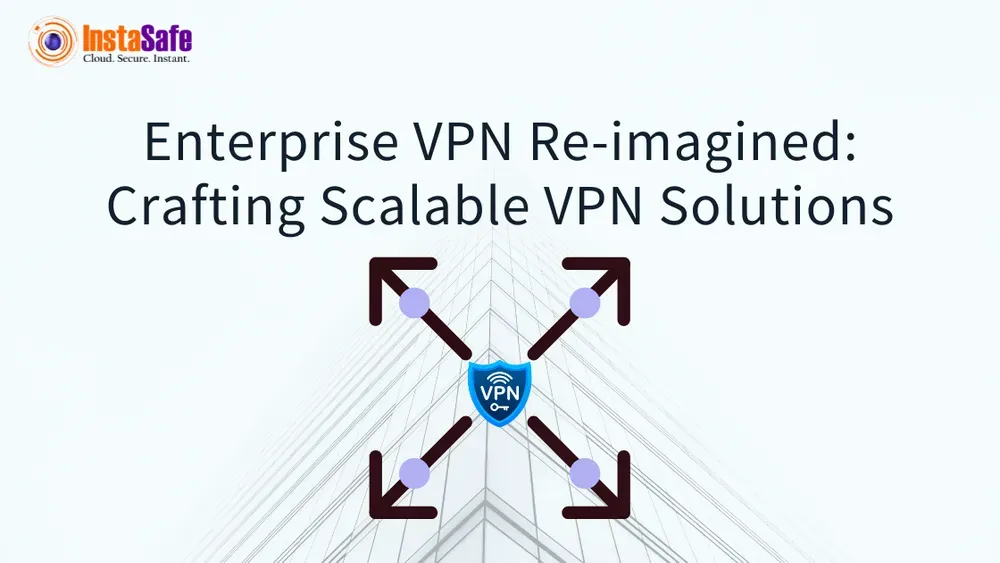Enterprise VPN Re-imagined: Crafting Scalable VPN Solutions

Working from home and remote working have become the norm and continue to be many organisations' ideal ways of operation even after two years post the pandemic.
While at the beginning stage of the global pandemic, the sudden shift to the remote working environment forced organisations and businesses to adopt the existing VPN infrastructure; they are looking for much more advanced, secure, and scalable enterprise VPN software to meet their needs.
The traditional VPN services aren't meant for and are designed to cater to the needs of a large-scale global workforce and come with several security risks and scalability issues.
In this article, we'll learn more about the problem with traditional VPNs and what is the best VPN solution for enterprises and organisations of today. Let's go!
The problem With Traditional VPNs and Why You Need Scalable Enterprise-Level VPN for Your Company
A traditional Virtual Private Network extends your company's private network across a public internet and network, allowing excessive implicit access and trust to all the users within the network.
However, these VPNs aren't optimised for large-scale and cloud remote work. Here are the major reasons why:
- Unlike modern enterprise VPN services, traditional VPN services assume all the users within the network to be secure and trustworthy, allowing them to access the network and its applications. Unfortunately, this excessive trust makes it easier for malicious hackers and attackers to hack within the network and exploit its data and critical resources.
- Traditional VPN solutions come with performance degradation issues, mainly because of the backhauling of the users' data traffic through DCs. This results in impeded network connectivity and network latency issues.
- Unlike an enterprise VPN Server, traditional VPNs work on perimeter-based access security. This means that users can access and open all the network's applications and resources once they enter the network resources, increasing the attack surface. Hence, it also exposes the IP addresses to the external network, which can be accessed and hacked into maliciously.
- Lastly and most importantly, VPNs come with management complexity and difficulty scaling as they require a lot of maintenance and operational expenditure for high maintenance and management.
Now, let's see how enterprise connect VPNs resolve these issues and ensure seamless network scalability.
Zero Trust Enterprise VPN Solutions: Excellent Solutions for Scalability
If you're looking for the top VPN solutions to replace your organisation's traditional VPNs, enterprise Zero Trust VPNs is the right choice.
Here are the top benefits of these VPNs:
Easy scalability
The best enterprise VPN solutions offer easy and seamless scalability because of their cloud nature.
They're easily deployable and don't come with any management complexity or huge operational expenses for maintenance. Instead, you can leverage on-demand scalability, and the network will scale and be deployed in days.
This scalability facilitates remote working environments and allows maximum employees or third-party vendors to access the network and its resources with ease.
High security
Zero Trust works on the ''Never Trust, Always Verify'' principle, eliminating the excessive implicit trust the traditional VPNs have. Instead, they only allow authenticated, authorised, and verified users and devices to access the network and its resources.
This restricted and strict access prevents malicious hackers from accessing the network, doesn't expose others' IP addresses, and prevents lateral movement, making it a much more secure and reliable network security solution for remote working.
Moreover, you can set the least privilege access or provide employees access to the network applications on a need-to-know basis. This model ensures that users can only access the network resources they require to do the work instead of accessing the entire network and its resources.
Control and visibility
Zer Trust solutions provide complete visibility over your network and its traffic. For example, you can view the user's activity and see who's accessing what applications and using which devices.
You can also leverage granular access controls and set user-specific access policies for enhanced network security.
Seamless user experience
The Zero Trust solutions offer a seamless and high-quality user experience compared to your traditional enterprise VPN.
Zero Trust allows your users to get single-click and seamless access to the resources and applications hosted anywhere from remote working locations. It also eliminates network latency or backhauling risks, boosting employees' overall productivity.
Conclusion
While traditional VPNs can support your network infrastructure and meet your remote working needs for short-term and small-scale projects, they significantly hamper the network's security, performance, and user experience when it's time to scale your network.
Hence, choosing a suitable Zero Trust VPN alternative is the key to ensuring a secure and scalable network environment.
Zero Trust prevents excessive trust, boosts performance, prevents backhauling, ensures seamless scalability, and facilitates remote working for your modern workplace and workforce.
So, if you need such a secure and scalable VPN alternative for your organisation, check out our InstaSafe solutions and the Zero Trust Secure VPN alternative to upgrade your network's security posture and make your organisation cloud and remote-working ready in today's work-from-home environment. Book a demo to learn more.
Key Products
MFA | I&AM | ZTNA | Zero Trust Application Access | Secure Enterprise Browser
Key Features
Single Sign On | Endpoint Security | Device Binding | Domain Joining | Always On VPN | Contextual Based Access | Clientless Remote Access | Device Posture Check
Key Solutions
VPN Alternatives | DevOps Security | Cloud Application Security | Secure Remote Access | VoIP Security
